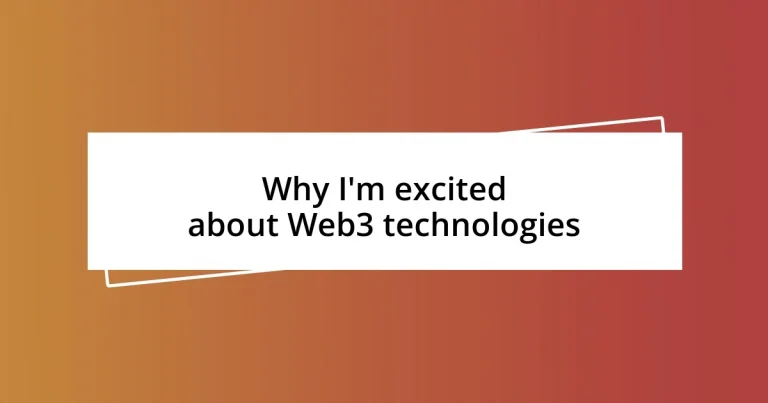Key takeaways:
- Web3 technologies empower users with enhanced data ownership, economic inclusivity, and greater transparency, fostering a more equitable digital environment.
- Industries such as supply chain, entertainment, and healthcare are being transformed by Web3, improving traceability, artist-fan relationships, and patient data management.
- Future trends in Web3 include the rise of decentralized autonomous organizations (DAOs), integration of artificial intelligence, and personalized digital experiences in the metaverse.
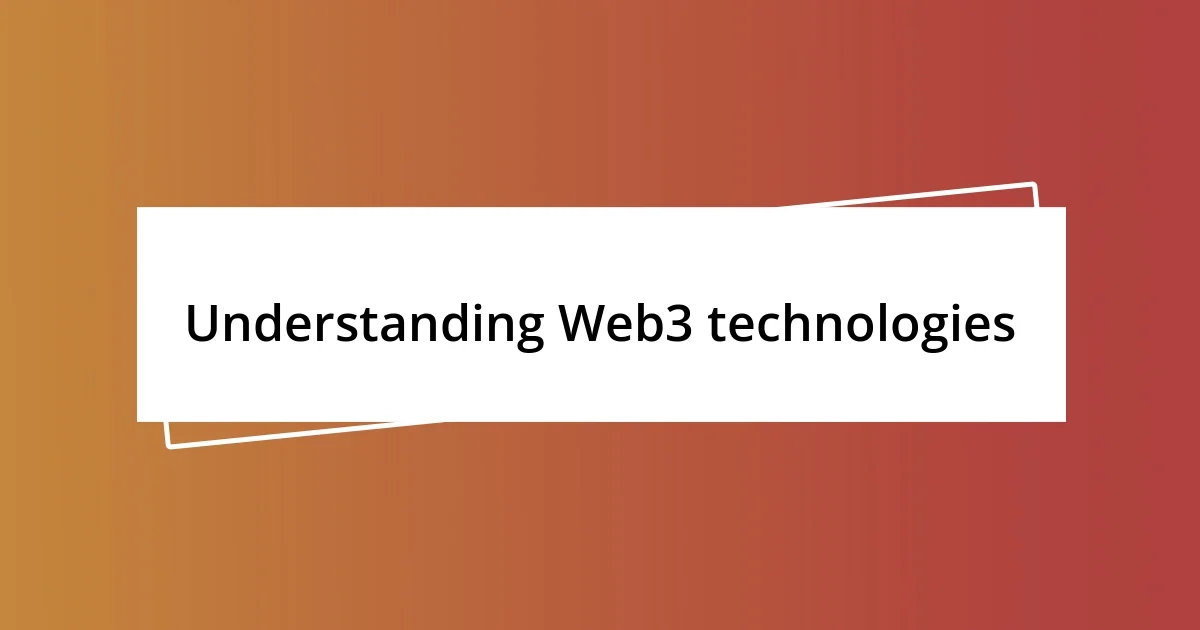
Understanding Web3 technologies
Web3 technologies represent a significant shift in how we interact with the digital world. When I first heard about blockchain, I remembered feeling a mix of curiosity and skepticism. How could this decentralized technology really empower users and challenge traditional systems? The more I dove into it, the clearer its potential became—especially regarding transparency and user control.
Smart contracts are another fascinating aspect of Web3. They automate agreements without needing a middleman, which, to me, felt revolutionary. I had a moment where I realized how this could streamline processes I once thought were cumbersome, like preparing rental agreements and ensuring they execute automatically based on conditions. Isn’t it extraordinary to think how this can save time and reduce friction in our daily transactions?
You can’t overlook the role of decentralized applications (dApps) that are emerging within this ecosystem. I was trying a dApp for the first time, and it struck me how different it felt compared to using traditional apps. There was a sense of ownership and participation that made me feel more connected to the community behind it. Have you ever felt that thrill of being part of something groundbreaking? It’s that excitement that keeps me engaged with Web3, knowing that we are witnessing the dawn of a new era in technology.

Key benefits of Web3
There are several key benefits of Web3 that genuinely excite me. One of the most significant advantages is the enhanced data ownership it offers. I remember when I first realized how much control I had surrendered to platforms like social media. With Web3, I’m now empowered to own and manage my data without relying on third-party companies. That sense of ownership not only breeds trust but also encourages a more authentic online experience.
Another remarkable benefit is the potential for economic inclusivity. I once spoke to a friend who had been exploring decentralized finance (DeFi) platforms, and their enthusiasm was infectious. They highlighted how these systems could provide access to financial services for those who were previously marginalized. It’s an empowering idea that everyone, regardless of their background, has a chance to participate in the economy.
- Data Ownership: Users gain full control over their personal data.
- Decentralized Finance (DeFi): Enables everyone access to financial services.
- Enhanced Transparency: Transactions are recorded on an immutable ledger for greater trust.
- Censorship Resistance: Content and applications can’t easily be taken down.
- Community Governance: Users can actively participate in decision-making processes.
The more I engage with these concepts, the clearer it becomes that Web3 isn’t just about technology; it’s about creating a more equitable digital environment for all of us.
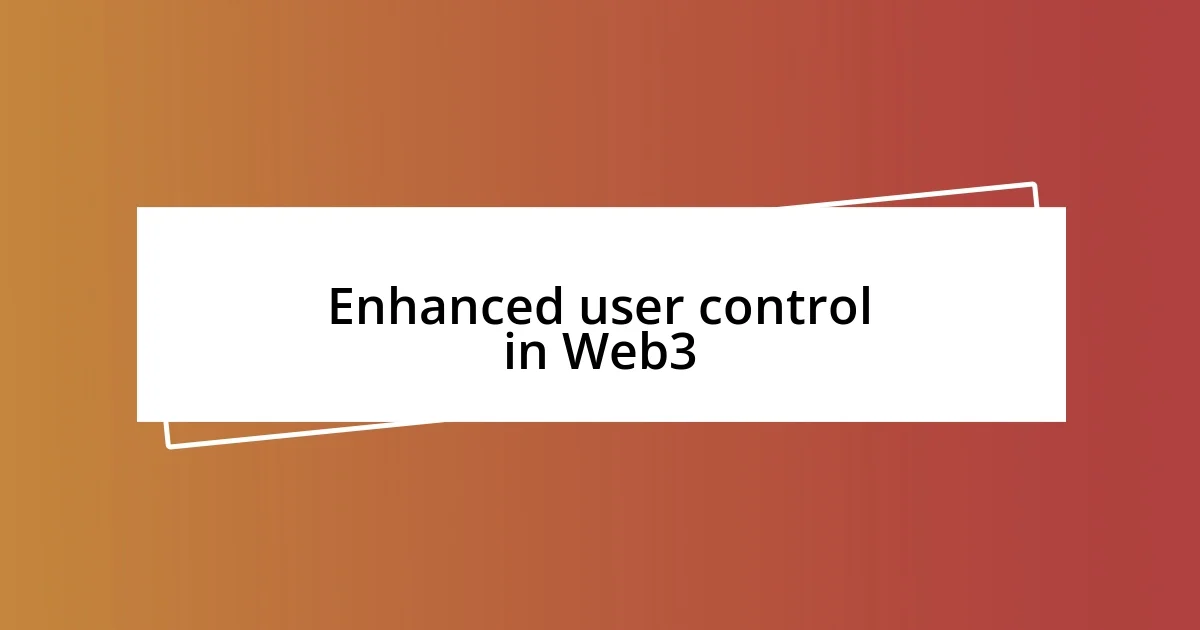
How Web3 transforms industries
Web3 is fundamentally reshaping industries, and I find it fascinating to watch this transformation unfold. For instance, take supply chain management. I remember attending a webinar about how blockchain can improve traceability. Companies can now verify the source of their products, which enhances sustainability and accountability. This newfound transparency allows consumers to make informed decisions, creating a ripple effect that promotes ethical practices throughout the supply chain.
The entertainment industry is also experiencing a renaissance due to Web3. I recently read about a musician who used NFTs to release exclusive tracks. What struck me was the direct relationship created between the artist and their fans, bypassing traditional music distribution channels. This paradigm shift not only empowers creators financially, but it also fosters a deeper emotional connection with their audience. Have you ever thought about how powerful it is for artists to directly engage with their devoted followers?
Meanwhile, the healthcare sector is leveraging Web3 for better data management and patient empowerment. I had a conversation with a healthcare professional who shared their excitement about using blockchain for patient records. This technology can ensure that health data is not only secure but also accessible to patients when they need it. This shift towards a patient-centered model aligns medical care with individual needs—how inspiring is that?
| Industry | Transformation through Web3 |
|---|---|
| Supply Chain | Enhanced traceability and sustainability through blockchain. |
| Entertainment | Direct artist-fan relationships via NFTs. |
| Healthcare | Patient empowerment through secure, accessible health records. |
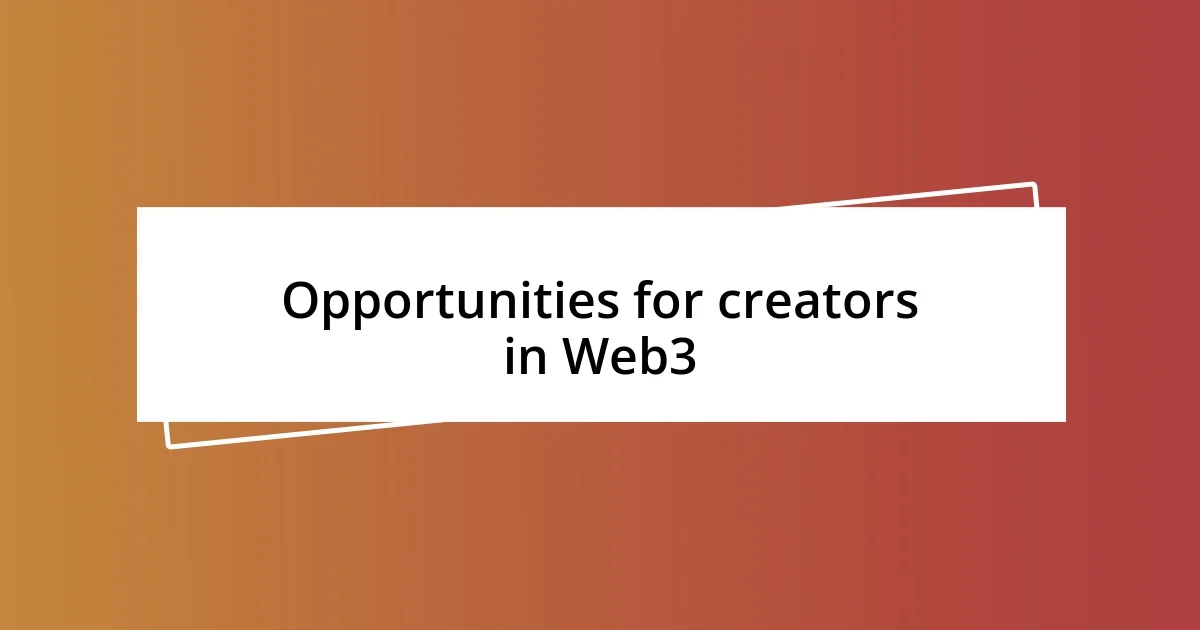
Real world applications of Web3
As I delve into the real-world applications of Web3, I can’t help but think about how it’s transforming philanthropy. I recently came across a platform that uses blockchain to ensure transparency in charitable donations. Imagine being able to track exactly how your contribution is being spent! It’s a powerful shift that could restore faith in charitable organizations. Have you ever felt uncertain about where your donations go? With this technology, that uncertainty fades away.
Another exciting application I’ve encountered is in the gaming industry. I was chatting with a friend who’s a passionate gamer, and they shared how blockchain is enabling players to truly own their in-game items. It’s like owning a rare collectible card, but in a digital realm. I find it thrilling to think that gamers can trade, sell, or use assets across different games. Doesn’t that open up a world of possibilities for creativity and commerce in gaming?
Then there’s the realm of education, where Web3 can revolutionize credentialing. I remember hearing about a startup that’s creating an immutable ledger for academic achievements. This means that diplomas and certifications can’t be forged, and employers can verify skills instantly. How reassuring is it to know that your qualifications are verifiable and tamper-proof? It’s a game-changer that could help bridge the gap between education and employment.
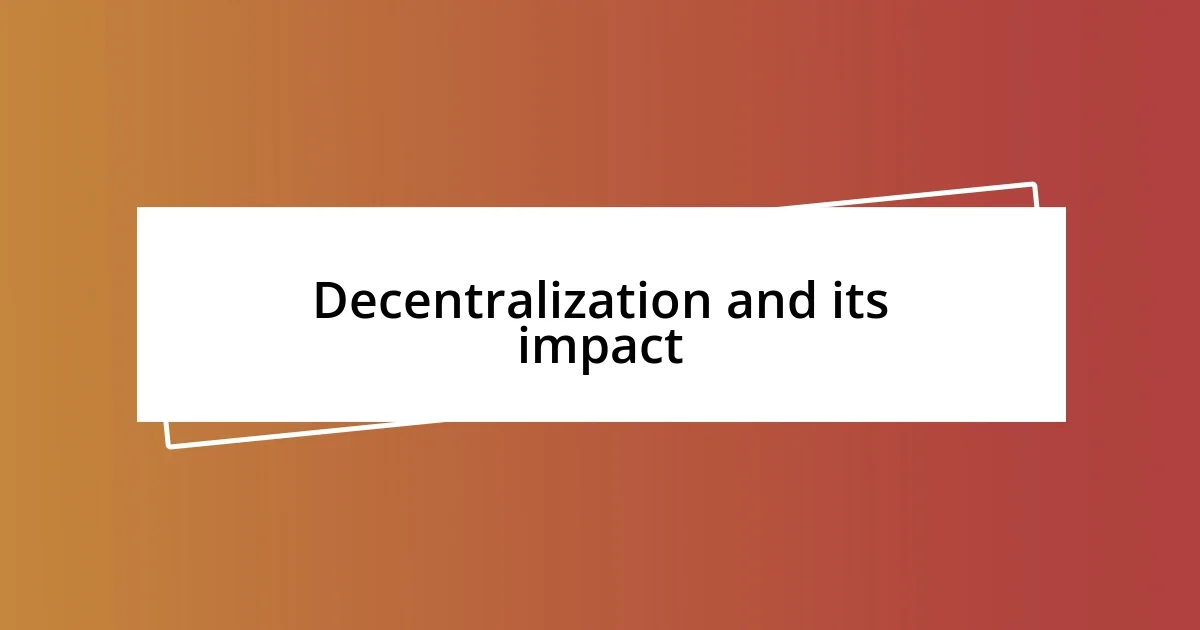
Future trends in Web3 technologies
The future of Web3 technologies is brimming with possibilities that excite me daily. One trend I foresee is the rise of decentralized autonomous organizations (DAOs). I remember discussing with a few tech-savvy friends how DAOs can empower communities to make collective decisions without centralized control. This could change the very notion of governance in organizations. Don’t you think it’s intriguing to consider how our voting power can extend beyond the traditional boardroom?
Another fascinating development is the integration of artificial intelligence with Web3. I once attended a conference where a speaker passionately illustrated how AI can analyze blockchain data for predictive insights. This intersection could revolutionize sectors like finance and healthcare, leading to smarter decision-making processes. Just imagine the potential of having AI models that enhance security and optimize operations simultaneously!
Lastly, I’m particularly excited about the potential for personalized digital experiences through Web3. I read about how blockchain can enable customizable avatars and unique virtual environments in the metaverse. This allows individuals to truly express their identities in ways we’ve only dreamed of before. Have you ever imagined walking into a virtual space that reflects your unique preferences and interests? It’s not just about technology; it’s about creating a community where individuality thrives.












